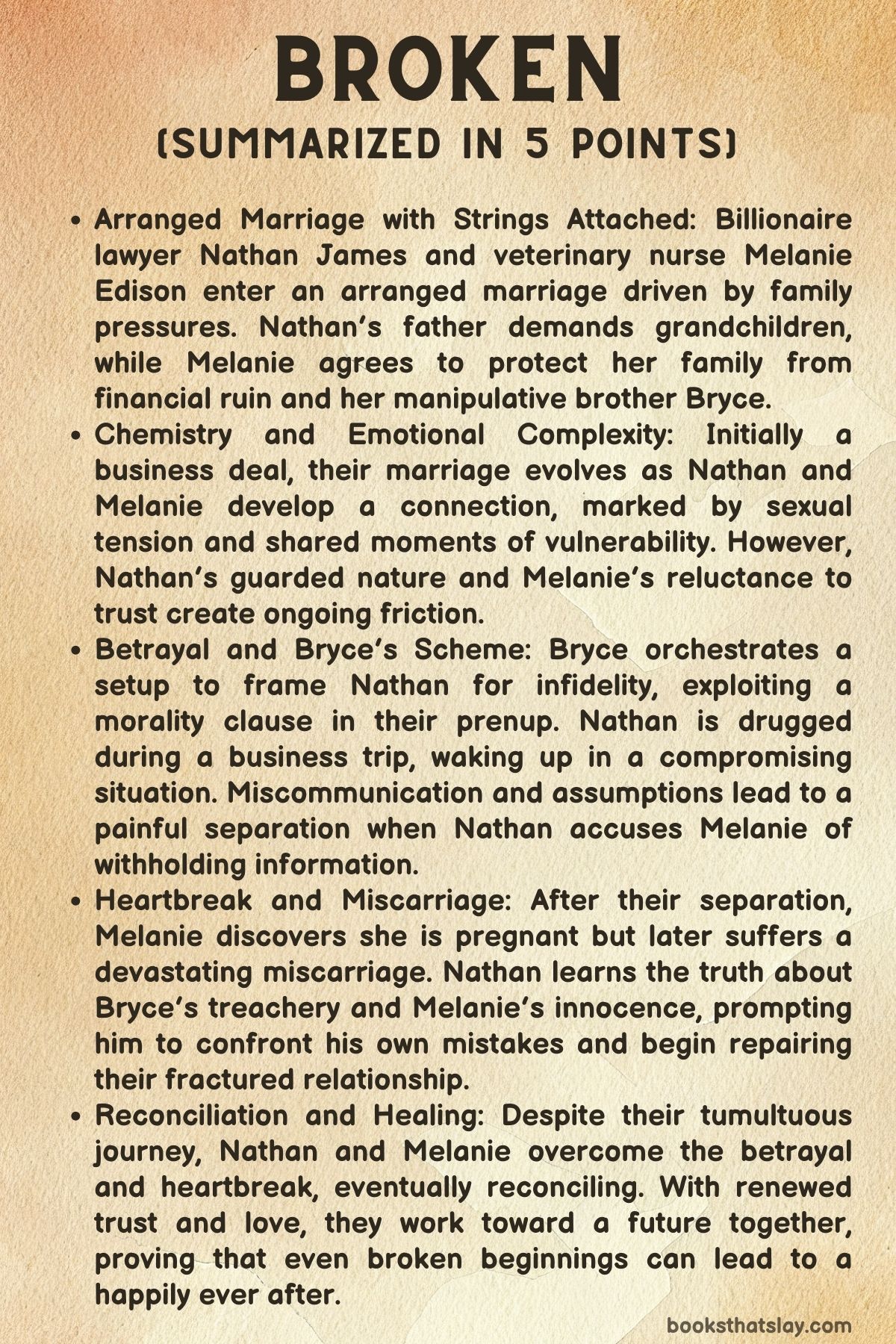Broken by Sadie Kincaid Summary, Characters and Themes
“Broken” by Sadie Kincaid is a steamy romance novel that combines themes of love, betrayal, and redemption within the framework of an arranged marriage.
Nathan James, a billionaire lawyer with a cold and calculated approach to relationships, enters into a contractual marriage with Melanie Edison, a fiercely loyal veterinary nurse driven to protect her struggling family. What begins as a business deal quickly evolves into an emotionally charged and tumultuous journey. As their undeniable chemistry clashes with external family pressures and personal insecurities, Nathan and Melanie must navigate betrayal, heartbreak, and tragedy to discover whether love can emerge from the ruins of their arrangement.
Summary
Nathan James, a wealthy and successful lawyer from an influential family, has built his life around avoiding emotional entanglements.
Guided by his father’s stern advice to never fall in love, Nathan enjoys a playboy lifestyle with no strings attached. However, his father’s desire for grandchildren forces Nathan into an arranged marriage with Melanie Edison, a veterinary nurse from an old-money family on the brink of financial ruin.
While Nathan sees this marriage as a pragmatic business transaction, Melanie reluctantly agrees to the union to protect her mother and younger sister from the manipulative control of her older brother, Bryce.
Initially, both Nathan and Melanie approach the marriage with detachment, determined to adhere to the terms of their contract: heirs first, no love. However, their undeniable attraction creates tension and complicates their arrangement.
As they grow closer, Nathan discovers a softer side of himself through Melanie’s kindness and dedication, while Melanie is charmed by Nathan’s generosity and wit. They develop an unlikely friendship, further deepened by shared moments of humor and intimacy.
Despite their mutual efforts to keep emotions at bay, their physical chemistry eventually overpowers their resolve. When their marriage becomes sexually charged, Nathan’s rough demeanor and explicit language sometimes create friction, as Melanie struggles with the disparity between their experiences.
Meanwhile, Bryce, desperate to salvage his family’s finances, schemes to exploit a morality clause in the couple’s prenup by framing Nathan for infidelity.
Bryce’s plan comes to fruition during Nathan’s business trip to Chicago. After being drugged, Nathan wakes up in bed with another woman, unable to recall the night’s events. Though a drug test confirms he was set up, the damage is done.
When Nathan learns that Melanie knew about Bryce’s manipulative tendencies but failed to warn him, he feels betrayed and demands a divorce. Melanie, devastated by his accusations, leaves.
While separated, Nathan discovers that Melanie had no role in Bryce’s scheme and only agreed to the marriage to save her family. However, his realization comes too late. Melanie’s emotional turmoil deepens when she discovers she is pregnant.
Though she informs Nathan, his initial suspicion about the baby’s paternity further shatters her trust. As tensions escalate, Melanie suffers a miscarriage alone, a devastating event that forces Nathan to reevaluate his behavior.
Determined to make amends, Nathan begins caring for Melanie during her recovery. Slowly, the two reconnect as Nathan uncovers Bryce’s deeper treachery and Melanie learns to forgive his earlier harshness.
Despite minimal groveling, Nathan’s efforts to protect Melanie from her toxic family and his growing emotional vulnerability eventually win her back. The couple reconciles, finding strength in their love and building a future together, proving that even a fractured beginning can lead to a happy ending.
In the end, “Broken” delivers a rollercoaster of emotions with themes of trust, healing, and the power of love amidst adversity.

Characters
Nathan James
Nathan is a complex character, shaped by his upbringing in a wealthy and powerful family. As a lawyer, he is highly intelligent and capable of dissecting legal agreements, and he approaches his arranged marriage with the same pragmatic mindset—viewing it as a contract rather than a union based on love.
His emotional barriers stem from his father’s stern advice about avoiding love, which he internalizes after the death of his mother. Initially, Nathan is emotionally distant and detached, hiding behind his wealth and social status.
His attraction to Melanie catches him by surprise, and despite his rules, he finds himself drawn to her. However, his emotional maturity is slow to develop, particularly in how he handles situations of trust and betrayal.
Nathan’s actions in the relationship, especially during times of conflict, demonstrate a lack of empathy and a tendency to act rashly. His reaction to betrayal, real or perceived, is often anger, leading him to push Melanie away even when she is not at fault.
Despite these flaws, Nathan experiences significant growth over the course of the story. His eventual acknowledgment of his feelings for Melanie and the realization of his mistakes mark his emotional evolution.
Nathan’s journey is one of self-discovery, where he learns to confront his past, deal with his insecurities, and slowly rebuild his connection with Melanie. However, his lack of a proper apology remains a source of critique.
Melanie Edison
Melanie’s character is deeply shaped by her family’s financial struggles and the toxic relationships she endures, particularly with her manipulative brother, Bryce. She comes from an old-money family that is now on the verge of ruin, and this influences her decisions throughout the story.
Melanie is practical, kind-hearted, and determined to protect her younger sister from the destructive forces in her family. While she enters the marriage with Nathan out of a sense of duty to her family, she is reluctant to be part of such an arrangement.
Melanie’s resilience and sense of duty lead her to form an emotional connection with Nathan, despite the terms of their contract. She finds herself falling for him, even as he maintains a cold, transactional approach to their relationship.
Her struggle between loyalty to her family and her growing affection for Nathan is central to her development. Melanie is forced to navigate a complex web of manipulation, deceit, and familial pressure, which complicates her relationship with Nathan.
The betrayal from her brother and the eventual miscarriage deeply affect her, revealing the depth of her vulnerability and emotional strength.
Melanie’s arc is about reclaiming her voice, asserting her own worth, and ultimately finding a measure of peace and happiness, despite the emotional turmoil she endures.
Bryce Edison
Bryce is the antagonist of the story, whose actions catalyze much of the conflict. As Melanie’s older brother, he is a controlling, manipulative figure who is responsible for the financial downfall of their family.
Bryce’s primary motivation is self-interest, and he sees Melanie’s marriage to Nathan as a way to restore their financial stability. His ruthlessness and disregard for the well-being of others are evident in his actions, particularly in his attempt to exploit the morality clause in the marriage contract to benefit his own interests.
Bryce orchestrates a “honey trap” to set Nathan up for infidelity, which leads to the breakdown of Nathan and Melanie’s relationship. His lack of remorse and continued manipulation make him a deeply unsympathetic character.
Throughout the novel, Bryce remains a source of tension, as his toxic influence on Melanie and his efforts to sabotage her marriage to Nathan serve as one of the key obstacles the couple must overcome.
Bryce’s eventual downfall and ousting from the family business mark the resolution of his arc, but his actions leave a lasting impact on the other characters, particularly Melanie.
Nathan’s Family
Nathan’s family, particularly his father and brothers, plays a significant role in the story, serving as both a source of pressure and support for him. Nathan’s father is a domineering figure who pushes Nathan to fulfill the family’s legacy by marrying and producing heirs.
His father’s relentless focus on the importance of maintaining the family line drives much of Nathan’s initial reluctance and emotional detachment. The James brothers, while not as prominent as Nathan’s father, also represent a level of familial expectation that Nathan struggles to meet.
Their eventual acceptance of Melanie into the family contrasts with Nathan’s resistance to fully accept her, further highlighting the tension between duty and personal desires.
The James family’s interactions with Melanie offer a stark contrast to her own toxic family dynamics, with Nathan’s family being more well-meaning, despite their often misguided actions.
Melanie’s Family
Melanie’s family is a key source of emotional turmoil throughout the story. Her relationship with her brother, Bryce, is fraught with manipulation and emotional abuse.
Bryce’s actions are driven by his greed and desire to restore the family’s financial standing, and he consistently uses Melanie as a pawn in his schemes. Her mother, though less overtly cruel than Bryce, is complicit in the family’s dysfunction, pushing Melanie into the marriage with Nathan as a way to secure financial stability.
Despite the toxic nature of her family, Melanie remains emotionally tied to them, primarily out of a sense of responsibility and the desire to protect her younger sister from Bryce’s influence. Her family’s actions significantly shape her choices and her emotional journey, as she tries to balance loyalty to them with her growing feelings for Nathan.
Melanie’s eventual realization that she must distance herself from her family in order to pursue her own happiness is a crucial part of her growth.
Themes
The Complex Dynamics of Marriage of Convenience and the Inevitable Collision with Genuine Emotion
The novel explores the intricacies of an arranged marriage, framed as a business transaction designed to meet the needs of both parties involved. Initially, Nathan and Melanie approach their union with the understanding that it is purely transactional, with no room for love or emotional attachment.
Nathan’s father, eager for grandchildren, and Melanie’s financially unstable family see this arrangement as the most practical solution. Nathan, a lawyer from an affluent family, views the marriage as a contract, and Melanie, driven by a sense of duty to protect her family, complies reluctantly.
However, the story quickly subverts this notion as both characters begin to develop genuine feelings for each other. Despite their initial agreement to avoid falling in love, their growing emotional bond reveals how difficult it is to maintain boundaries in relationships when true intimacy begins to form.
Their internal conflicts—Nathan’s fear of vulnerability and Melanie’s fear of being hurt—illustrate the complexities of how two individuals navigate the transition from a practical arrangement to a genuine, loving connection. The novel poignantly shows that even the most calculated agreements can be derailed by the unpredictable nature of human emotions.
The Destructive Power of Trust Issues, Betrayal, and Miscommunication in Romantic Relationships
A central theme of the book is the breakdown of trust between Nathan and Melanie, fueled by betrayal and miscommunication. Despite the initial promise of a pragmatic partnership, both characters are caught in a cycle of misunderstanding, with each believing the other is hiding something crucial.
Nathan’s reaction to the “honey trap” plot orchestrated by Melanie’s brother, Bryce, exemplifies the delicate balance of trust in their relationship. Nathan, already harboring skepticism about the authenticity of their marriage, quickly jumps to conclusions when he learns of Melanie’s family’s manipulative intentions, assuming she is complicit in the scheme.
This assumption leads to an explosive confrontation and emotional fallout, ultimately escalating their separation. Melanie, in turn, feels betrayed by Nathan’s refusal to believe her, and her silence regarding her brother’s scheme only deepens the rift.
The narrative underlines how a lack of transparent communication and the failure to confront uncomfortable truths can cause irreparable damage to relationships. As the story progresses, both characters’ journeys toward forgiveness and understanding highlight the intense emotional toll that comes with the struggle to rebuild trust after it has been shattered.
The Intersection of Family Dysfunction, Emotional Manipulation, and the Burden of Loyalty
Family dynamics play a crucial role in shaping the motivations and actions of both Nathan and Melanie, contributing to the emotional stakes of the story. For Nathan, his family’s pressure to conform to their expectations of producing heirs forces him into a position where he feels both trapped and obligated.
His father’s authoritative stance, combined with the continuous push from his brothers, leaves Nathan with little room for personal desires. The James family’s well-intentioned but invasive interference becomes a major source of internal conflict for Nathan, who grapples with fulfilling his familial duties while struggling to maintain his sense of independence and autonomy.
On the other hand, Melanie’s family, particularly her brother Bryce, is the antithesis of Nathan’s. Bryce’s emotional manipulation, coupled with the constant threats to Melanie’s well-being and her responsibility for protecting her younger sister, forces Melanie to make difficult choices that often contradict her own desires and moral compass.
The novel portrays how toxic family dynamics and emotional manipulation can force individuals into making decisions out of fear or obligation rather than love or personal choice. Both Nathan and Melanie must navigate the expectations and toxic behaviors of their families, ultimately realizing that breaking free from these manipulations is crucial for their individual growth and the survival of their relationship.
The Psychological Impact of Trauma, Loss, and the Healing Process in Relationships
A critical turning point in the novel is the exploration of trauma and its profound effects on both Nathan and Melanie, particularly when it comes to their emotional vulnerabilities and the complexities of healing. Melanie’s past miscarriages and the emotional scars left by her family’s abusive control are central to her character’s development.
These past traumas significantly influence her ability to trust, both in herself and in Nathan. Her miscarriage in the later stages of the novel is another defining event, showcasing the physical and emotional toll that such loss takes on her.
Nathan’s response to this event, while initially inadequate, begins to reflect his growing understanding of the depths of Melanie’s suffering. His clumsy attempts at offering support reveal his own inability to fully empathize with her pain, but also his determination to be there for her, despite his previous emotional detachment.
The miscarriage becomes a catalyst for Nathan’s character evolution, where he starts to confront his own issues with commitment and emotional intimacy. The healing process for both characters is gradual and complicated, marked by moments of tenderness interspersed with emotional setbacks.
Their eventual reconciliation comes not through grand gestures or perfect apologies, but through the raw, vulnerable moments of shared grief and support, which ultimately help them rebuild their relationship from a place of greater understanding and empathy.
The Complicated and Often Unresolved Nature of Accountability, Apology, and Forgiveness in Romantic Conflict
One of the most contentious aspects of the novel is the tension between Nathan and Melanie regarding accountability and the need for a meaningful apology. Nathan, while eventually realizing the extent of his errors, never fully apologizes for his harsh treatment of Melanie or his quickness to blame her for things she did not do.
The absence of a significant, heartfelt apology from Nathan becomes a point of frustration for many readers, as it underscores the disparity between his actions and the emotional support Melanie requires. Though Nathan does make efforts to show he is capable of change, his lack of overt remorse reflects the complex nature of his character—someone who struggles with vulnerability and accountability.
Melanie, for her part, also bears responsibility in their conflicts, particularly in her failure to warn Nathan about Bryce’s scheme. However, the novel reveals that true forgiveness is not contingent on grand apologies or perfect behavior. Instead, it is about recognizing the efforts to change, even when the words or actions do not fully align with what is expected.
The lack of a conventional apology, especially after Nathan’s treatment of Melanie, highlights the novel’s focus on the messy, imperfect nature of forgiveness in relationships, where understanding and emotional growth can sometimes take precedence over formal atonement.


